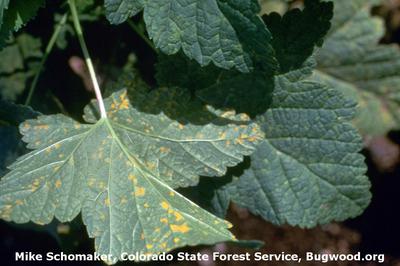White Pine Blister Rust
Cronartium ribicola
Fungus
In a Nutshell
- Yellow spots on the underside of the leaves.
- Brown elevated fungal threads.
Can also be found in
Symptoms
Yellow spots appear on the upper leaf surface in early summer and the underside of the leaf displays yellowish blisters. Later, brownish-yellow fungal threads grow on the underside of the leaves. Unlike other fungi, they do not have the form of a film or layer, but are clearly elevated. At a final stage of infection with White Pine Blister Rust, leaves fall off.
Recommendations

Organic Control
Remove infected foliage as soon as possible and cut back affected parts of the plant.

Chemical Control
There are no fungicides available to treat the White Pine Blister Rust on currants and gooseberries.
What caused it?
White Pine Blister Rust is not a serious disease for alternate hosts such as currants and gooseberries, but is a very serious disease for Pines. The fungal spores are transported by wind and can be carried over very long distances. Fungi generally prefer a warm, humid climate, so locations with good ventilation are needed to dry quickly after rainfall.
Preventive Measures
- Leave sufficient space between plants to ensure good ventilation.
- Don’t plant currants and gooseberries in close proximity to pine trees.
- Plant less vulnerable varieties.


